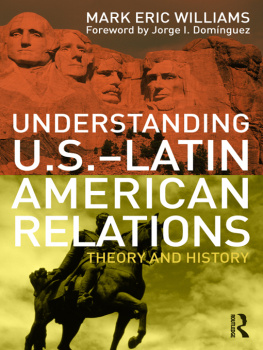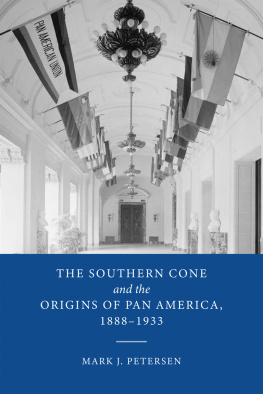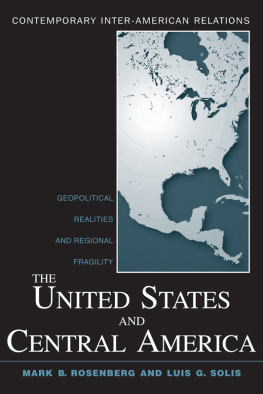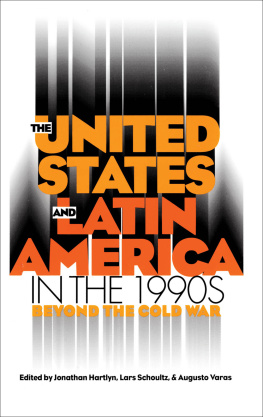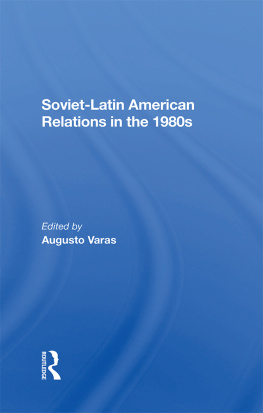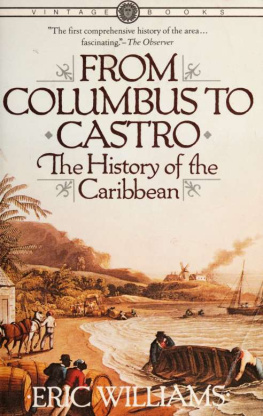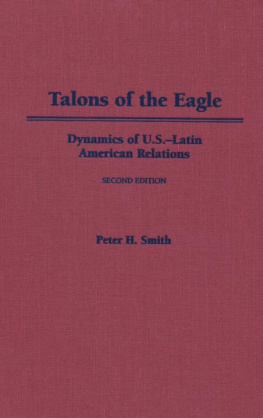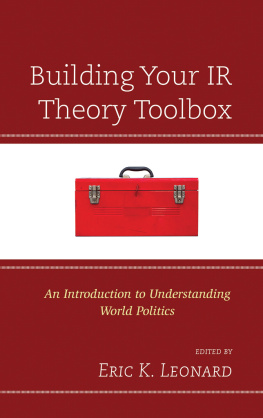Understanding U.S.Latin American Relations
This book examines U.S.Latin American relations from an historical, contemporary, and theoretical perspective. By drawing examples from the distant and more recent pastand interweaving history with theoryWilliams illustrates the enduring principles of International Relations theory and provides students the conceptual tools to make sense of inter-American relations. It is a masterful guide for how to organize facts, think systematically about issues, weigh competing explanations, and confidently draw your own conclusions regarding the past, present, and future of international politics in the region.
Mark Eric Williams is Professor of Political Science at Middlebury College. His research interests include U.S.Latin American Relations, International Relations, Comparative Latin American Political Economy, Venezuelan Foreign Policy, and Mexican Politics.
Map of North America
Map of South America
First published 2012
by Routledge
711 Third Avenue, New York, NY 10017
Simultaneously published in the UK
by Routledge
2 Park Square, Milton Park, Abingdon, Oxon OX14 4RN
Routledge is an imprint of the Taylor & Francis Group, an informa business
2012 Taylor & Francis
The right of Mark Eric Williams to be identified as author of this work has
been asserted by him in accordance with sections 77 and 78 of the Copyright,
Designs and Patents Act 1988.
All rights reserved. No part of this book may be reprinted or reproduced or
utilized in any form or by any electronic, mechanical, or other means, now
known or hereafter invented, including photocopying and recording, or in
any information storage or retrieval system, without permission in writing
from the publishers.
Trademark notice: Product or corporate names may be trademarks or
registered trademarks, and are used only for identification and explanation
without intent to infringe.
Library of Congress Cataloging in Publication Data
Williams, Mark Eric, 1954
Understanding U.S.Latin American relations : a discourse between theory
and history / Mark Eric Williams.
p. cm.
Includes bibliographical references and index.
1. Latin America--Foreign relations--United States. 2. United States--Foreign
relations--Latin America. I. Title. II. Title: Understanding US-Latin American
relations. III. Title: Understanding United States-Latin American relations.
JZ1519.A57U6 2011
327.7308--dc23
2011022098
ISBN: 9780415993142 (hbk)
ISBN: 9780415993159 (pbk)
ISBN: 9780203805107 (ebk)
Printed and bound in the United States of America on acid-free paper by
Edwards Brothers, Inc.
Acquisitions Editor: Michael Kerns
Development Editor: Felisa Salvago-Keyes
Editorial Assistant: Mary Altman
Production Editors: Sin Findlay and Alf Symons
Foreword
What is the key problem that Latin American countries have faced in the international system? The problem is easy to name but difficult to analyze. The name of the problem is the United States of America.
Consider the name. In the late eighteenth century, thirteen small former British colonies on the eastern seashore of North America sought boldly to appropriate for themselves the symbolic name of the entire American continent. The country might have been called the United States East of the Appalachians and South of the Great Lakes but, alas, it chose a name bound to confuse forevermore primary school children from Tierra del Fuego to Hudson Bay.
Consider the behavior. Only the United States has posed a credible military threat to its Latin American near-neighbors. It acquired Spanish Florida through coercive diplomacy. It invaded Mexico in 1846 and went on to annex half of the countrys territory. In 1898, it conquered Puerto Rico and occupied Cuba. In the decades that followed, it repeatedly sent troops to occupy the Dominican Republic, Nicaragua, Haiti and, at times, Cuba, all of which it occupied for years, sometimes decades. It compelled Panamas secession from Colombia. It invaded Mexico yet again in 1914 and 1917. In the second half of the twentieth century, it organized military forces to overthrow the governments of Guatemala (successfully), Nicaragua (unsuccessfully), and Cuba (unsuccessfully). It invaded the Dominican Republic (1965), Grenada (1983), Panama (1989), and Haiti (1994, 2003) to overthrow their governments. From the 1940s to the 1970s, the U.S. government supported military coups near and far, across the Americas, all in the name of protecting freedom.
U.S. capacities did not equip it to invade much further than the southern Caribbean, we now know, but South Americans did not quite know what to expect for much of the time from 1846 to the end of the 1920s when U.S. forces withdrew from occupation of several of its near-neighbors, never to return. But during that near-century of repeated military actions and especially in 1898, in response to the U.S. defeat of Spain and its seizure of Spains remaining American colonies (Puerto Rico and Cuba), the Uruguayan Jos Enrique Rod wrote the first best-selling nonfiction work to spread like wildfire across the world of the Spanish-speaking peoples. How should Latin Americans assess the United States? Why was its culture vulgar, its Protestantism designed as an arm of the criminal law to curtail the passions and shame the wicked, its military power so threatening, and yet what made it so successful and, in some respects, so admirable?

